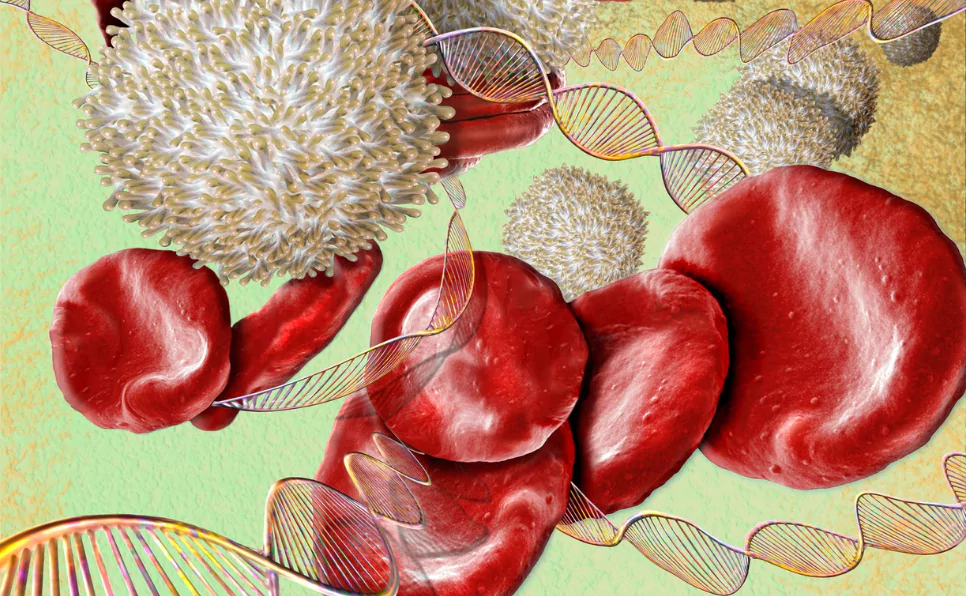As someone deeply immersed in the world of genetics and its impact on human health, I’m often asked about the relationship between our genes and body weight.
It’s a fascinating subject that touches upon not only our physical appearance but also our overall well-being.
In this article, we’ll look into the most studied genes for weight gain, exploring how our genes influence our tendency for weight gain and how understanding this connection can help us to make informed decisions about our health.
Key Takeaways
- Our genes like LEP, FTO, and MC4R influence various aspects of weight regulation, including metabolism, appetite, and fat storage.
- While genetics play a significant role in obesity, environmental factors and lifestyle choices also contribute to weight management.
- Genetic testing can provide valuable insights into our genetic predispositions for obesity and help tailor personalized weight management strategies.
- Adopting a holistic approach to weight management, including diet, exercise, and behavioral modifications, is essential for long-term success.
The Science of Genetics and Weight
Genetics is the study of genes, the hereditary units that determine our traits.
These genes are made up of DNA, which contains the instructions for building and maintaining our bodies.
When it comes to weight, certain genes can predispose individuals to gain or lose weight more easily than others.
These genes influence factors such as metabolism, appetite regulation, and fat storage.
Key Genes For Weight Gain & Obesity
Understanding how specific genes influence obesity and weight can provide insights into why some individuals struggle more with weight management than others.
Here are several key genes involved in obesity and weight regulation.
LEP (Leptin Gene)
Leptin, a hormone produced primarily by fat cells, serves as a key regulator of energy balance by inhibiting hunger, thereby reducing fat storage in adipocytes.
It acts as a signal to the brain regarding the body’s energy status, helping to control appetite and energy usage.
The LEP gene carries the instructions for producing leptin, making it a cornerstone in the body’s ability to maintain a healthy weight.
How Mutations in LEP Affect Weight
Mutations in the LEP gene can lead to a complete absence of leptin production, a rare but severe condition.
Individuals with such mutations experience extreme hunger from birth, leading to chronic overeating (hyperphagia) and rapid weight gain early in life.
Treatment strategies for leptin deficiency include leptin replacement therapy, which has shown promise in restoring normal appetite and weight in affected individuals.
LEPR (Leptin Receptor Gene)
The leptin receptor, encoded by the LEPR gene, is crucial for mediating the effects of leptin.
It binds to leptin, allowing the hormone to carry out its role in regulating energy balance.
The leptin receptor is expressed in various tissues, including the hypothalamus in the brain, where it influences appetite and energy expenditure.
The Impact of LEPR Mutations on Weight Management
Mutations in the LEPR gene disrupt the normal functioning of the leptin receptor, leading to a lack of response to leptin’s signals.
Similar to LEP mutations, individuals with LEPR mutations experience intense hunger and severe obesity due to the body’s inability to regulate appetite and energy expenditure effectively.
These mutations highlight the critical role of the leptin-leptin receptor pathway in controlling body weight and the potential consequences when this system malfunctions.
FTO (Fat Mass and Obesity-Associated Gene)
The FTO gene has been the focus of extensive research since it was first linked to the genetics of obesity.
Variants of the FTO gene are associated with a higher risk of obesity and type 2 diabetes.
The gene’s exact mechanisms are complex and involve multiple pathways, but its influence is primarily observed in two areas: appetite regulation and energy expenditure.
How FTO Affects Appetite and Energy Expenditure
Individuals with certain variants of the FTO gene tend to have a higher body mass index (BMI) and an increased appetite.
Studies suggest that these FTO gene variants can lead to increased energy intake with no corresponding increase in energy expenditure.
In simpler terms, people with these genetic variations may feel hungrier and thus eat more, without burning off extra calories at an increased rate. This imbalance can lead to weight gain over time.
MC4R (Melanocortin 4 Receptor Gene)
The MC4R gene plays a critical role in controlling energy balance, appetite, and satiety (feeling full).
It encodes the melanocortin 4 receptor, which is part of a signaling pathway in the brain that helps regulate body weight.
When this pathway is disrupted, it can lead to increased food intake and reduced energy expenditure.
MC4R Variants and Obesity through Satiety and Energy Balance
Variants in the MC4R gene can decrease the receptor’s activity, leading to increased appetite and a preference for high-calorie foods.
This can make weight management challenging for individuals with these genetic variations, as they may not feel full as quickly and may have tendencies towards overeating.
ADIPOQ (Adiponectin Gene)
The Influence of ADIPOQ on Fat Metabolism and Insulin Sensitivity
Adiponectin, a hormone produced by fat cells, plays a key role in regulating glucose levels and fatty acid breakdown.
The ADIPOQ gene, which encodes the adiponectin hormone, influences fat metabolism and insulin sensitivity.
High levels of adiponectin are associated with a lower risk of obesity and type 2 diabetes.
How ADIPOQ Affects Weight and Health
Individuals with certain genetic variants in the ADIPOQ gene that lead to lower adiponectin levels may have a higher risk of developing obesity, insulin resistance, and metabolic syndrome.
By improving adiponectin levels through lifestyle changes, such as diet and exercise, individuals may be able to mitigate some of the genetic risks associated with these variants.
Extra Reading: Genetics of weight regain!
Other Significant Genes: PPARG, APOA5
PPARG and Its Role in Lipid Metabolism
The PPARG gene is crucial for the regulation of fatty acid storage and glucose metabolism.
Variants of this gene can affect how the body metabolizes fats, influencing obesity risk and the development of type 2 diabetes.
Specifically, certain PPARG variants can lead to increased fat storage in adipocytes (fat cells), contributing to obesity.
APOA5 and Its Impact on Fat Storage
The APOA5 gene is involved in the regulation of triglyceride levels, a type of fat found in the blood.
Variants in the APOA5 gene can significantly affect triglyceride metabolism, leading to higher levels of triglycerides, which are associated with an increased risk of obesity and cardiovascular diseases.
Understanding one’s APOA5 gene variants can provide insights into their risk of developing obesity-related complications.
So, the genetic factors influencing obesity and weight are complex and multifaceted. While the LEP, FTO, MC4R, ADIPOQ, PPARG, and APOA5 genes play significant roles in appetite regulation, energy balance, fat metabolism, and insulin sensitivity, they represent just a fraction of the genetic influences on obesity.
Understanding the function of these genes can provide valuable insights into why some people struggle with weight while others seem to maintain a healthy weight effortlessly.
This information can also help individuals and healthcare providers develop more targeted and effective strategies for weight management and overall health improvement.
Genetics and Lifestyle in Weight Control
While genetics play a significant role in determining our susceptibility to obesity, they are not the sole determining factor.
Environmental influences, such as diet, physical activity, and lifestyle choices, also play a crucial role in weight management.
For example, someone with a genetic predisposition to obesity may still maintain a healthy weight through regular exercise and a balanced diet.
Epigenetics and Weight
Epigenetics is the study of how environmental factors can influence gene expression without altering the underlying DNA sequence.
In the context of weight management, epigenetic changes can occur in response to diet, exercise, and other lifestyle factors, influencing how our genes are expressed.
This means that even if we have genetic predispositions to obesity, we can still modify our gene expression through healthy lifestyle choices.
Identifying Your Genetic Risks for Obesity
The Role of Genetic Testing in Understanding Weight
Genetic testing offers a glimpse into our genetic makeup and can provide valuable insights into our risk of obesity.
By analyzing specific genes associated with weight regulation, genetic tests can help individuals understand their genetic predispositions and tailor their weight management strategies accordingly.
Tailoring Weight Management Strategies to Your Genetic Profile
Interpreting genetic test results can be complex, which is why it’s essential to consult with a healthcare professional or genetic counselor.
They can help decipher the results and provide personalized recommendations based on your genetic profile.
Understanding your genetic risks for obesity can empower you to take proactive steps towards better health.
Personalized Diet Plans
Based on your genetic predispositions, healthcare professionals can design personalized diet plans that optimize weight loss and maintenance.
For example, individuals with certain genetic variations may benefit from a low-carbohydrate diet or protein diet, while others may thrive on a high-protein diet.
Customized Exercise Regimens
Similarly, exercise regimens can be tailored to your genetic profile to maximize results.
For instance, individuals with a genetic predisposition to slow metabolism may benefit from high-intensity interval training, while those with a predisposition to muscle strength may focus on resistance training.
Medications and Advanced Treatments
In some cases, medications or surgical interventions may be recommended to help manage obesity, especially for individuals with significant genetic predispositions.
These treatments should be used along with lifestyle modifications for the best outcomes.
Final Words
Our genes play a crucial role in determining our susceptibility to obesity, but they do not dictate our destiny.
By understanding our genetic predispositions and making informed lifestyle choices, we can take control of our health and well-being.
Whether through personalized diet and exercise plans or medical interventions, there are plenty of options available to support us on our weight management journey.
Behavioral modifications, such as mindful eating and stress management, can help overcome genetic challenges and support long-term weight loss.
References
- Genome-wide meta-analysis uncovers novel loci influencing circulating leptin levels | Nature Communications
- Association between LEPR, FTO, MC4R, and PPARG-2 polymorphisms with obesity traits and metabolic phenotypes in school-aged children | Endocrine
- Interaction between genes involved in energy intake regulation and diet in obesity | Nutrition
- Genes and individual responsiveness to exercise-induced fat loss | Sports, Exercise, and Nutritional Genomics

Dr. Sumeet is a seasoned geneticist turned wellness educator and successful financial blogger. GenesWellness.com, leverages his rich academic background and passion for sharing knowledge online to demystify the role of genetics in wellness. His work is globally published and he is quoted on top health platforms like Medical News Today, Healthline, MDLinx, Verywell Mind, NCOA, and more. Using his unique mix of genetics expertise and digital fluency, Dr. Sumeet inspires readers toward healthier, more informed lifestyles.





